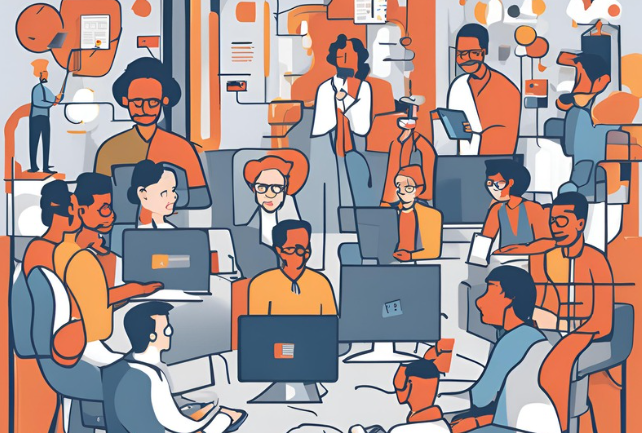The IT job and hiring market has changed significantly in 2024 as a result of considerable advancements in tech hiring trends, adjustments in workplace dynamics, and modifications in candidate expectations. Organisations face significant hurdles in attracting top personnel as they adjust to a world where technical innovation and digital transformation are critical. The COVID-19 epidemic gave rise to the growing acceptance of conducting remote interviews and hybrid work arrangements, which are now expected by most job applicants.
Hiring procedures are also changing as a result of the growing need for specialised digital skills. These skills include cloud computing, cybersecurity, and artificial intelligence. To fill skill gaps, organisations are investing in a suitable coding interview platform and reskilling programs. Therefore, to maintain a competitive edge, organisations must modify their hiring practices to adjust to the rising trends and cultivate a welcoming and dynamic work environment.

Top 10 Tech Hiring Trends in 2024
As of 2024, here are the top 10 tech hiring trends shaping the industry:

1. Rise of Hybrid Roles
Professionals with hybrid skill sets will continue to be in high demand in 2024. Candidates who can combine technical proficiency with soft skills like communication, creativity, and adaptability are in higher demand from employers. Also, this pattern is a reflection of how tech jobs are changing and how cross-functional skills are becoming increasingly important. Hence, more jobs are becoming hybrid, like data scientists with project management experience or UX/UI designers who can code.
2. Remote Work and Global Talent
Due to shifting worker preferences and the development of digital communication and coding interview tools, remote work is now the rule rather than the exception. Tech firms are taking advantage of this change by reaching out to international talent pools, which gives them access to a variety of viewpoints and skill sets. Thus, it is anticipated that in 2024, remote-first or hybrid work arrangements will predominate in the tech industry, allowing employers to draw in top talent regardless of location.
3. Demand for Cybersecurity Experts
In 2024, there continues to be a significant need for cybersecurity specialists due to the growing frequency and sophistication of cyberattacks. Therefore, to protect their digital assets, businesses from all sectors are giving cybersecurity infrastructure and personnel investments top priority. The continued concerns about data security and privacy have led to an increased demand for cybersecurity specialists.
4. AI and Machine Learning Roles
Industries are still being disrupted by AI and Machine Learning, which is increasing the need for qualified experts who can create, implement, and optimise AI-powered solutions. By the end of 2024, jobs involving AI and ML will be found in several industries. These jobs include finance, e-commerce, healthcare, and autonomous systems. Predictive analytics, computer vision, and NLP are areas where expertise is highly sought as businesses want to capitalise on data-driven insights.
5. Diversity, Equity, and Inclusion (DEI)
Initiatives about diversity, equity, and inclusion are being given more weight by tech organisations when it comes to hiring. A deliberate effort is being made to build more diverse workplaces that represent the views and experiences of the workforce. To encourage innovation and boost employee retention, employers are putting DEI-focused recruitment methods into practice. These strategies include inclusive workplace policies, diverse applicant sourcing, and bias-free hiring procedures.
6. Blockchain and Cryptocurrency
Professionals with experience in blockchain programming, cryptography, and smart contracts are in high demand as blockchain technology and cryptocurrencies become more widely accepted. By the end of 2024, blockchain applications will be investigated by sectors outside of fintech, including supply chain management, healthcare, and real estate. Additionally, developers with specialised knowledge in decentralised technology are finding new possibilities as a result of this mobility.
7. Agile and DevOps Practices
In 2024, DevOps techniques and agile approaches remain essential to software development and IT operations. Agility, cooperation, and automation are becoming top priorities for organisations to improve operational efficiency and speed up product delivery. To shorten development cycles and enhance software quality, professionals with knowledge of DevOps tools like Docker and Kubernetes and Agile frameworks like Scrum and Kanban are in great demand.
8. Upskilling and Continuous Learning
For tech workers in 2024, upskilling and ongoing learning are crucial due to the quick speed at which technology is changing. Employers are upgrading skills in cutting-edge technologies like edge computing, quantum computing, and 5G networks by investing in a coding assessment platform and employee development programs. Moreover, micro-credentials and certifications are becoming more respected as markers of proficiency and dedication to career advancement.
9. Enhanced Candidate Experience through AI
AI-driven technologies are revolutionising the employment process for candidates. Companies are using AI to improve hiring results and expedite the recruitment process by using it for coding tests for interviews, resume screening, and applicant sourcing. Therefore, to make better-informed hiring decisions and lessen bias in recruiting procedures, AI algorithms are being utilised to evaluate candidates’ talents and cultural fit.
10. Green Tech and Sustainability
Tech businesses are incorporating green tech and sustainability projects into their employment strategy in response to mounting concerns about climate change. Moreover, professionals with the ability to provide renewable energy solutions, maximise resource efficiency, and integrate eco-friendly procedures in IT operations are expected to be in greater demand this year. Therefore, for IT professionals who are enthusiastic about sustainability, positions in environmental engineering, sustainable software development, and green IT consulting are becoming more and more realistic.
Tips for Adopting Tech Hiring Trends 2024
To remain competitive and draw in top individuals, it is imperative that companies deliberately use the latest tech hiring trends. A thorough analysis of how businesses can adopt and apply these tech hiring trends is provided below.

1. Strategic Talent Acquisition
Developing a well-thought-out plan for talent acquisition guarantees that your hiring objectives and overarching business goals are in sync. This method assists in pinpointing crucial areas, such as hybrid positions or advanced talents, where your organization’s needs and rising digital trends collide. It entails establishing precise hiring goals and making plans to efficiently handle future personnel demands.
Implementation: Start by examining the long-term objectives and technology requirements of your business. To forecast future recruiting needs, use workforce analytics and data-driven insights. Also, make a thorough plan that includes recruitment tactics, including sourcing techniques and KPIs. Additionally, review and modify the plan regularly in light of changing business priorities and market developments.
2. Utilise Technology in Hiring
By increasing candidate involvement and automating activities, a cutting-edge online coding interview tool can greatly improve your hiring process. Applicant tracking systems, video interview platforms, and AI-powered solutions improve the hiring process and increase its effectiveness in discovering top talent.
Implementation: Make an investment in hiring technology that works in unison with your current HR systems. Use AI-driven technologies for candidate matching, scheduling coding interviews, and resume screening. Evaluate the effectiveness of an online interview tool regularly by examining recruitment metrics and getting input from hiring teams and applicants.
3. Boost Your Employer Brand
By highlighting your company’s distinctive culture, values, and career prospects, a great employer brand draws in top talent. Employer brands that are strong set your company out from the competition and emphasise what makes it an attractive place to work.
Implementation: Create a thorough employer branding plan that includes job postings, social media posts, and your website with engaging content. Provide firm accomplishments, employee success stories, and workplace culture insights. Make sure your brand messaging is consistent with your target audience by using surveys and feedback.
4. Adopt Adaptive Work Schedules
Providing flexible work arrangements, including remote or hybrid choices, can help employers attract a wider talent pool and satisfy the growing desire for work-life balance. Workplace flexibility is becoming more and more important for both employee retention and worker happiness.
Implementation: Establish and promote explicit policies for remote work that cover expectations for performance, communication, and technology. Invest in technology and collaboration solutions that facilitate remote work. Review and update these policies frequently in light of employee input and evolving company requirements.
5. Emphasise Ongoing Training
By allocating resources towards ongoing education and training, you can guarantee that your team members stay current with emerging technologies and market trends. Their abilities are improved, creativity is stimulated, and career advancement within your company is supported by this dedication.
Implementation: Create a program for learning and growth that provides access to online courses, opportunities for professional development, and certificates. Also, establish a structure for professional advancement that incorporates internal job rotation and mentorship initiatives. Encourage staff members to create learning objectives and monitor their advancement through frequent reviews.
6. Use DevOps and Agile Methodologies
Agile and DevOps methodologies enhance operational effectiveness and accelerate product delivery through the promotion of cooperation and automation. These approaches improve software quality and enable organisations to respond to changes swiftly.
Implementation: Provide Agile framework training to your teams, such as Scrum and Kanban, and use DevOps tools like Kubernetes and Docker. Create a culture of continuous delivery and integration (CI/CD) by defining precise procedures and performance indicators. Evaluate and improve your DevOps and Agile processes regularly in response to team input and project results.
7. Promote an Inclusive and Diverse Culture
Encouraging diversity, equity, and inclusion (DEI) in your company fosters innovation and improves the work environment. Different viewpoints and ideas are brought to the table by a diverse staff, and this can improve decision-making and problem-solving.
Implementation: Create and carry out DEI programs that emphasise inclusive hiring procedures, such as impartial recruiting procedures and a varied pool of candidates. Provide all staff with regular DEI training, and create employee resource groups to assist those on the margins. To make sure there is progress and to make the required corrections, track and report on DEI metrics.
8. Improve the Experience for Candidates
Attracting and keeping top talent depends on providing a positive remote interviewing experience to candidates. Simplifying the hiring procedure and communicating clearly enhances candidate happiness and builds your company brand.
Implementation: Make your hiring process more efficient by streamlining the remote technical interview and giving prompt feedback. Also, utilise applicant questionnaires to learn more about their background and pinpoint areas in need of development. Additionally, Make sure the people in charge of recruiting are properly taught to deal with candidate relations courteously and professionally.

Conclusion
The hiring process in 2024 has changed to emphasise remote work, hybrid roles, and specialised skills as technology continues to advance quickly. Businesses need to adjust by embracing a suitable technical interview assessment, and work schedules, making upskilling investments, and using AI to expedite the hiring process.
The industry’s need for highly skilled technical personnel is reflected in the emphasis on cybersecurity, artificial intelligence, and machine learning positions, and a dedication to diversity, equity, and inclusion guarantees a creative and dynamic work environment. In this competitive market, firms can attract and retain top talent by using online coding interview platforms, establishing an inclusive culture, and carefully managing talent acquisition.
